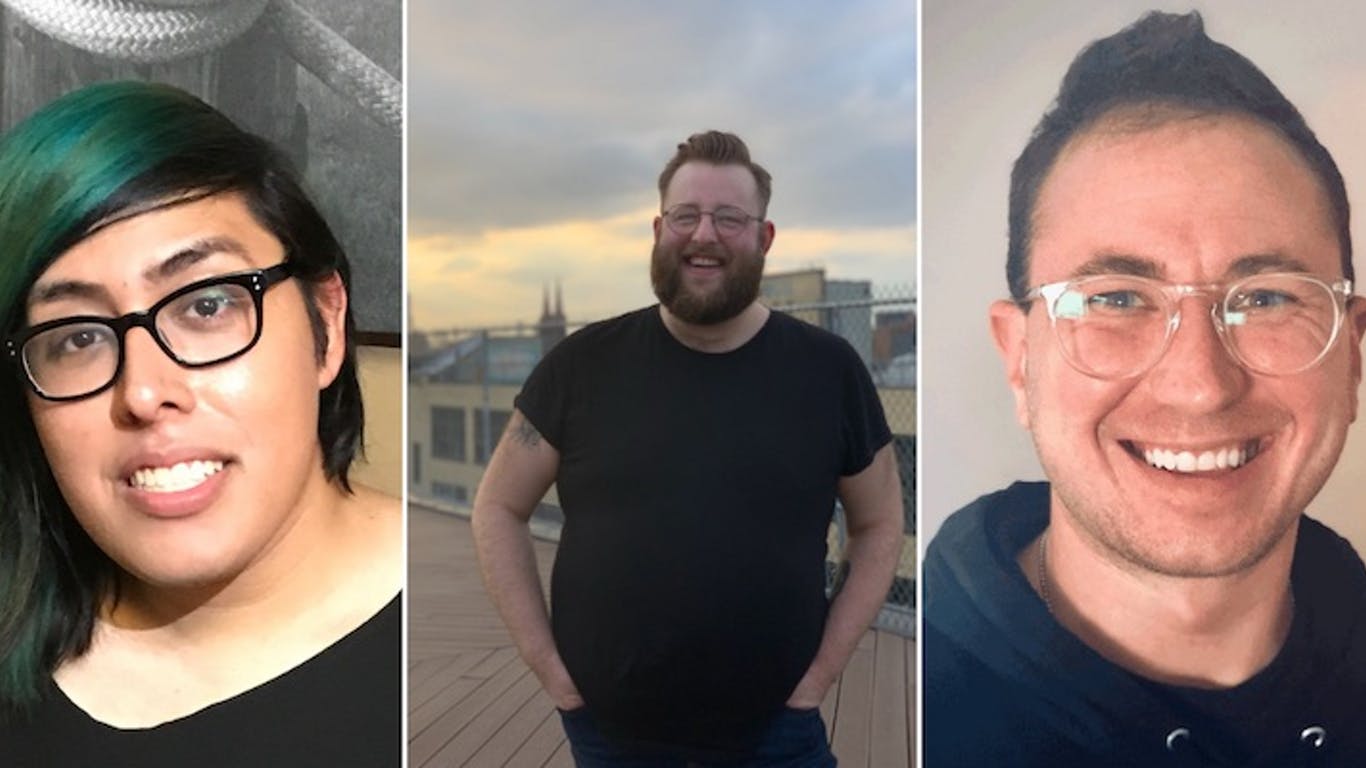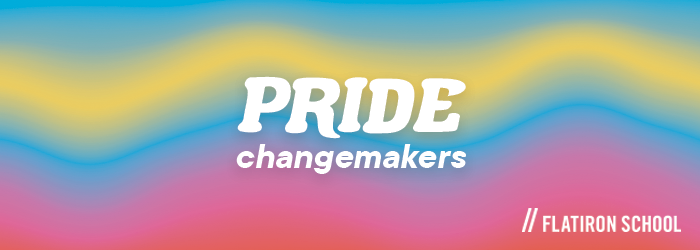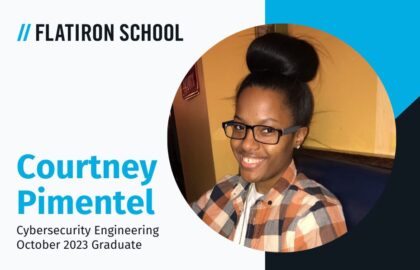Celebrating Pride With These Changemakers Breaking Down Barriers in Tech

At Flatiron School, we believe diversity and inclusion are at the heart of change. Whether it’s in your career, life, or community, empathy and inclusivity…
At Flatiron School, we believe diversity and inclusion are at the heart of change. Whether it’s in your career, life, or community, empathy and inclusivity can lead to meaningful change. Pride Month is a special time for Flatiron School and the WeWork family as we come together to celebrate our diverse and inclusive student community and workforce. In our classrooms and our communities, we’ve created an environment where every student can be who they are and built a future they love with the support of their community. Through our diversity initiatives and scholarships, we’re working year-round to make tech more inclusive.
We want to highlight a few Changemakers who are breaking down barriers in the tech industry and are champions of LGBTQ+ rights and inclusivity. In the classroom, on campus, or in the workforce, these Changemakers are making tech a more inclusive space.

Big and small actions
Before he arrived at Flatiron School, Max G. experienced homelessness after a series of uncomfortable conversations with his family. “Things started to get worse as I began my transition,” he recalls. “After having an uncomfortable conversation with my father, I fled to New York City where I lived in a series of church basements.”
As a way to help himself and other members of the LGBTQ+ community experiencing homelessness, Max mapped out available resources such as social services systems, trans-friendly housing, or where to get food. The maps also had a review mechanism so his friends could “have a voice.” Max wanted to learn to code to help the LGBTQ+ community, but didn’t have the resources to attend a coding bootcamp.
Max’s situation improved enough with the new found support of his biological family in Baltimore that, when Flatiron School opened our Washington, D.C. campus, he applied and received a full scholarship to attend. “I was overwhelmed with joy.” Through Flatiron School, Max gained the skills he needed to start a new life in the tech community.
He is now a developer at SmartLogic in Baltimore where he earns a good salary and receives health benefits.
With his new tech skills and life experiences, Max is a champion for inclusion in the tech community. Sometimes, that’s accomplished by having a conversation about gender norms or pointing out that an event may not be inclusive to non-binary members of the community. Other times, it’s serving as a mentor to LGBTQ+ individuals who want to enter the tech community. “Being a changemaker could be relatively large or relatively small. You just never know what the ripple effect will be,” he says.
For anyone who wants to support inclusion in tech, Max recommends being receptive to feedback and to take a moment to think about your words and recognize that not everyone comes from the same background. “In general, be grateful to be in the tech community.”
Inspiring others to be the best version of who they are
As the Manager of Employer Partnerships, Kyle P. helps ensure our campuses are welcoming and inclusive. One way of doing that is by having specialized groups at each campus, including online, that support the LGBTQ+ community. “We have built a safe space for our students to learn and be their authentic selves,” he says. “We are looking at it in big ways and little — I took it upon myself to re-write the dress code for our career fair to show a little more inclusivity.” Some of the campuses also have monthly lunches for the LGBTQ+ community.
While he understands there’s still work to be done in the tech community, he believes in its potential. “I truly think the tech space is the most progressive space to be yourself in,” he says. “Almost every workplace I’ve seen or worked with in tech has a safe space for the LGBTQ+ community.”
He recalls his own experiences and wishes he had the support he’s seen in the tech community. “Being from the South — I will be completely transparent and honest — coming out wasn’t the easiest thing I’ve ever done,” he says. “I wish I had the LGBTQ+ community within tech as I was finding what I wanted my career path to look like.”
Tech is everywhere and supportive communities can be found in every city. “There’s such an ecosystem for the LGBTQ+ community within tech that it’s a family,” he says. “No matter what city you are in, there’s always someone there supporting you.”
As an Out in Tech mentor, he’s helping LGBTQ+ individuals find their place in tech. He encourages everyone to be themselves and find someone who helps you build your confidence. “Being a Changemaker means getting to help change lives every day and to inspire people to be the absolute best version of themselves that they can be.”
Being true to yourself
Alice B. was always interested in programming. She was working at a large furniture retail company, but wanted to do more with her career.
She tried to go solo and learn JavaScript as her first language. It was a difficult experience and led to a lot of false starts. “Learning JavaScript was like trying to paint a masterpiece before learning how to draw a circle,” she says.
We teach Ruby because it’s a great introduction to programming languages. It’s relatively intuitive and you don’t need to learn a lot to start seeing your work influence what’s on the page.
She heard about Flatiron School and decided to pursue a coding education through our Online Software Engineering course. She could work part-time and still learn the skills she needed to change careers.
Alice’s friends in the LGBTQ+ community encouraged her to join the tech community. “A big part of me getting into tech was due to my LGBTQ friends encouraging me to be true to myself and come out,” she says. “And it was coming out that actually also made me realize how much I had put my life on pause, So, that’s when I decided to pursue tech as a career.”
She also experienced Impostor Syndrome while at Flatiron School. She was afraid to ask questions and struggled. But, she decided to take a risk and ask for help. The online community immediately helped out. “People don’t judge you at Flatiron School. They’re not going to look down on you if you don’t know something,” she says.
Asking for help gave her the confidence to complete the online program. She’s now a Section Lead Instructor at Flatiron School and can help others who are battling Impostor Syndrome.
Disclaimer: The information in this blog is current as of June 11, 2019. Current policies, offerings, procedures, and programs may differ.



